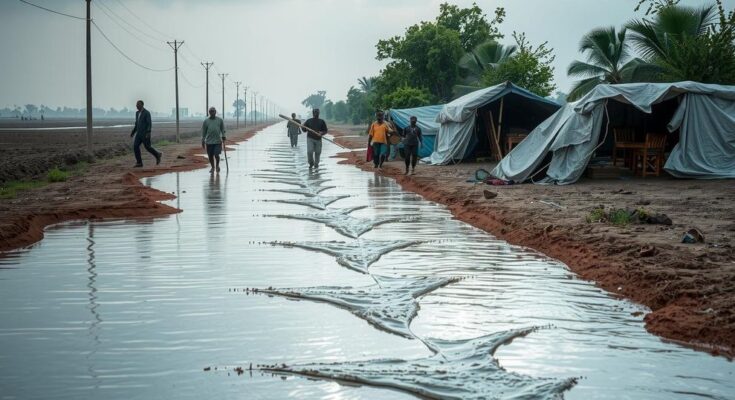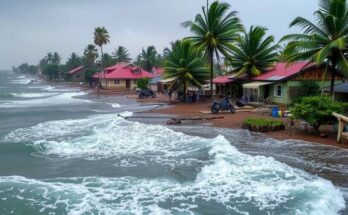Flooding has forced thousands to become displaced in South Sudan, particularly in Ayod, where families are living alongside a canal after losing their homes. Over 379,000 people are reported to have been affected by the floods this year, signaling a climate disaster exacerbated by poor governance and infrastructure shortcomings. Residents face dire conditions, lacking basic services and relying heavily on humanitarian aid.
Flooding has become an annual calamity in South Sudan, profoundly impacting the lives of thousands of inhabitants. In Ayod, displaced families have taken refuge along a canal, which has turned into a makeshift community as they grapple with the aftermath of relentless floods that devastated their homes. Among them is Bichiok Hoth Chuiny, a septuagenarian who had never experienced such a displacement before. Equally troubled, she expressed, “Too much suffering,” highlighting the struggles faced by many in finding shelter and basic necessities.
This situation has escalated, as reported by the United Nations, which estimates that over 379,000 individuals have been uprooted due to this year’s flooding. The World Bank describes South Sudan as the country most susceptible to climate change, lacking adequate infrastructure to cope with such adversities. Traditionally, the influx of water from seasonal floods has been manageable for pastoral communities, yet, as Daniel Akech Thiong from the International Crisis Group notes, it is eroding the fundamental practices of cattle-raising and farming among the Dinka, Nuer, and Murle communities.
Since its independence in 2011, South Sudan has struggled with internal conflicts and ineffective governance, exacerbating the plight of its citizens amidst environmental challenges. Factors contributing to the current flooding crisis include the opening of upstream dams in Uganda and the ongoing expansion of swamp areas that obliterate villages and agricultural land.
The century-old Jonglei Canal, despite its incomplete status, has inadvertently provided refuge to those escaping the floods. Chief Peter Kuach Gatchang reveals a stark reality, stating, “We don’t know up to where this flooding would have pushed us if the canal was not there.” However, essential services remain conspicuously absent in the hastily assembled community of Pajiek.
While villagers receive food aid from the World Food Program, the increasing reliance on external assistance speaks volumes about their dire situation. Amidst these challenges, residents contend with issues such as extreme healthcare shortages, as reported by Juong Dok Tut, a clinical officer in Paguong village. With supplies dwindling and staff unpaid for months, they face mounting health risks, including snake bites. The lack of adequate roads and delivery systems further complicates access to food and medical care, demonstrating the urgent need for a robust response to the calamities ravaging the region.
The flooding in South Sudan reflects a combination of natural disaster and systemic governance failures. This region has historically experienced seasonal flooding, but accelerating climate change has intensified its effects. The government, weakened by years of civil conflict, struggles to provide for its citizens, many of whom are now reliant on humanitarian assistance. The complete and timely implementation of infrastructure and governance reforms is critical to ensure long-term resilience against environmental challenges.
In summary, the inundation crisis in South Sudan has displaced thousands, highlighting the tangible toll of climate change on vulnerable populations. As the international community steps in to provide aid, the systemic issues facing the governance of the nation remain unresolved. A holistic approach, addressing both immediate humanitarian needs and long-term structural improvements, is fundamental to restoring stability and resilience in the region.
Original Source: abcnews.go.com




